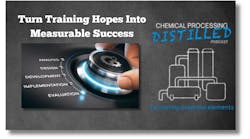Chemical makers long have benefited from collaborative efforts to address issues facing our industry. By becoming members of groups focused on developing insights on a specific topic broadly relevant to the chemical industry, firms can do more jointly than they ever could do alone.
[pullquote]
Some of these groups concentrate on a particular unit operation. An excellent example is Fractionation Research, Inc., www.fri.org, which conducts programs on large-scale mass transfer equipment. Its aim is to help members make the most of distillation technology. In a similar vein, Heat Transfer Research, Inc., www.htri.net, performs application-oriented research on heat exchangers, with the goal of advancing design and effective operation.
Meanwhile, Process Industry Practices, www.pip.org, strives to improve internal company guidelines and practices for design, procurement, construction and maintenance.
Avoiding operational issues also gets the attention of groups. For instance, the Center for Operator Performance, https://operatorperformance.org, which just spun off from Wright State University (see: “Center for Operator Performance Goes Independent,” focuses on helping plant operators function most effectively, while the Abnormal Situation Management Consortium, www.asmconsortium.net, concentrates on tackling challenges specifically posed by control systems.
Companies also benefit from collaborative work on process safety, e.g., through the efforts of the Mary Kay O’Connor (MKO) Process Safety Center at Texas A&M University (http://psc.tamu.edu) and the American Institute of Chemical Engineers’ Center for Chemical Process Safety. (For a number of years, the MKO Center has worked with Chemical Processing to provide free webinars on various aspects of process safety. Look here for details on the 2019 roster of webinars.)
Unfortunately, one area lacking such a concerted collective effort is preparing newly graduated chemical engineers to function effectively in industry.
Today, most graduates leave their universities with a thorough backgrounding in the fundamental principles of chemical engineering — but without much, if any, idea of how chemical plants actually operate.
One factor certainly contributing to this disconnect is an educational establishment that largely disdains practitioners. We’re not about to change that situation. The idea of spending some time after graduation at a chemical maker or engineering firm and then returning to academia, wiser for the experience, too often evokes derision.
So, industry must contend with filling the void in the practical knowledge of newly minted engineers. Mentoring certainly helps but workload and loss of expertise caused by retirements undermine many efforts. (For details on some initiatives to capture knowledge and effectively transfer it to new staff, see “Plants Seek Right Recipe for Seasoning.”)
Collaborative efforts could play a role. Here, I’m not referring to research programs about knowledge capture and transmission, which certainly are worthwhile. Instead, I’m thinking specifically of a “boot camp” approach.
I can see real value in a group of operating companies getting together to help their new hires learn about the equipment and systems they’ll encounter. Educate them about the different types of pumps and their appropriate applications — likewise for valves, heat exchangers and other process equipment. Provide an orientation to utility systems such as steam and cooling water.
I foresee offering such a boot camp — say, a couple of weeks long — quarterly with its location rotating among sites of member companies.
What do you think?
MARK ROSENZWEIG is Chemical Processing's Editor in Chief. You can email him at [email protected].



